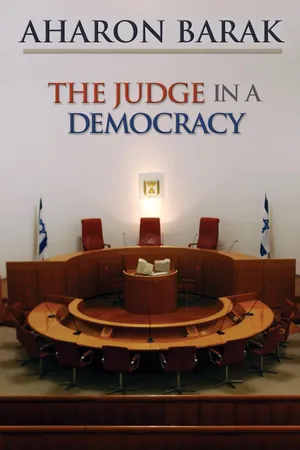
The Judge in a Democracy
Aharon Barak
- 368 pages
- English
- ePUB (mobile friendly)
- Available on iOS & Android
The Judge in a Democracy
Aharon Barak
About This Book
Whether examining election outcomes, the legal status of terrorism suspects, or if (or how) people can be sentenced to death, a judge in a modern democracy assumes a role that raises some of the most contentious political issues of our day. But do judges even have a role beyond deciding the disputes before them under law? What are the criteria for judging the justices who write opinions for the United States Supreme Court or constitutional courts in other democracies? These are the questions that one of the world's foremost judges and legal theorists, Aharon Barak, poses in this book.
In fluent prose, Barak sets forth a powerful vision of the role of the judge. He argues that this role comprises two central elements beyond dispute resolution: bridging the gap between the law and society, and protecting the constitution and democracy. The former involves balancing the need to adapt the law to social change against the need for stability; the latter, judges' ultimate accountability, not to public opinion or to politicians, but to the "internal morality" of democracy.
Barak's vigorous support of "purposive interpretation" (interpreting legal texts--for example, statutes and constitutions--in light of their purpose) contrasts sharply with the influential "originalism" advocated by U.S. Supreme Court Justice Antonin Scalia.
As he explores these questions, Barak also traces how supreme courts in major democracies have evolved since World War II, and he guides us through many of his own decisions to show how he has tried to put these principles into action, even under the burden of judging on terrorism.
Frequently asked questions
Information
Table of contents
- Table of Contents
- Introduction
- PART ONE THE ROLE OF THE JUDGE
- CHAPTER ONE Bridging the Gap between Law and Society
- CHAPTER TWO Protecting the Constitution and Democracy
- PART TWO THE MEANS OF REALIZING THE JUDICIAL ROLE
- CHAPTER THREE Preconditions for Realizing the Judicial Role
- CHAPTER FOUR The Meaning of Means
- CHAPTER FIVE Interpretation
- CHAPTER SIX The Development of the Common Law
- CHAPTER SEVEN Balancing and Weighing
- CHAPTER EIGHT Non-Justiciability, or “Political Questions”
- CHAPTER NINE Standing
- CHAPTER TEN Comparative Law
- CHAPTER ELEVEN The Judgment
- PART THREE THE RELATIONSHIP BETWEEN THE COURT AND THE OTHER BRANCHES OF THE STATE
- CHAPTER TWELVE Tension among the Branches
- CHAPTER THIRTEEN The Relationship between the Judiciary and the Legislature
- CHAPTER FOURTEEN The Relationship between the Judiciary and the Executive
- PART FOUR EVALUATION OF THE ROLE OF A JUDGE IN A DEMOCRACY
- CHAPTER FIFTEEN Activism and Self-Restraint
- CHAPTER SIXTEEN The Judicial Role and the Problem of Terrorism
- CHAPTER SEVENTEEN The Role of the Judge: Theory, Practice, and the Future
- THEORY